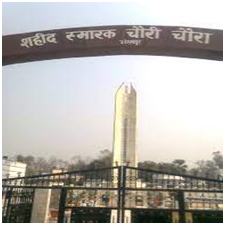Nation marks 100 years of chauri chaura incident
What is the news:
- The chauri chaura incident completed 100 years on 4 February this year.
- The Prime Minister, Shri Narendra Modi inaugurated ‘Chauri Chaura’ Centenary Celebrations at Chauri Chaura, Gorakhpur, Uttar Pradesh today through video conference.
- The day marks 100 years of the ‘Chauri Chaura’ incident, a landmark event in the country’s fight for independence.
- The Prime Minister also released a postal stamp dedicated to the Chauri Chaura centenary event. Governor of Uttar Pradesh Smt Anandiben Patel and Chief Minister of Uttar Pradesh Shri Yogi Adityanath were also present on the occasion.
What is chauri cahura incident:
- The Chauri Chaura incidenttook place on 4 February 1922 at Chauri Chaura in the Gorakhpur district of the United Provinces (modern-day Uttar Pradesh) in British India, when a large group of protesters participating in the non-cooperation movement, were fired upon by the police.
- In retaliation the demonstrators attacked and set fire to a police station, killing all of its occupants. The incident led to the death of three civilians and 22 policemen.
- Mahatma Gandhi, who was strictly against violence, halted the non-cooperation movement on the national level on 12 February 1922, as a direct result of this incident.
- In spite of Gandhi’s decision, 19 arrested demonstrators were sentenced to death and 14 to imprisonment for life by the British colonial authorities.

The incident :
- Two days before the incident, on 2 February 1922, volunteers participating in the non-cooperation movement led by a retired soldier of the British Indian Army named Bhagwan Ahir, protested against high food prices and liquor sales at Gauri Bazaar.
- The demonstrators were beaten back by the local Daroga(inspector) Gupteshwar Singh and other police officers. Several of the leaders were arrested and put in the lock-up at the Chauri Chaura police station. In response to this, a protest against the police was called on 4 February, to be held at the Bazaar.
- On 4 February, approximately 2,000 to 2,500 protesters assembled and began marching towards the market lane at Chauri Chaura.
- They had gathered to picket the Gauri Bazaar Liquor Shop. Armed police were dispatched to control the situation while the protesters marched towards the Bazaar, shouting anti-British slogans.
- In an attempt to frighten and disperse the crowd, Gupteshwar Singh ordered his 13 local police officers to fire warning shots into the air.
- This only agitated the crowd who began to throw stones at the police.
- With the situation getting out of control, the sub-inspector Prithvi Pal ordered the police to open fire on the advancing crowd, killing three and wounding several others.
- Reports vary on the reason for the police retreat, with some suggesting that the constables ran out of ammunition while others claimed that the crowd’s unexpectedly assertive reaction to the gunfire was the cause.
- In the ensuing chaos, the heavily outnumbered police fell back to the shelter of the police chowkiwhile the angry mob advanced. Infuriated by the gunfire into their ranks, the crowd set the chowki ablaze, killing all of the Indian policemen including Singh and the constables trapped inside.
Aftermath
- In response to the killing of the police, the British colonial authorities declared martial law in and around Chauri Chaura.
- Several raids were conducted and hundreds of people were arrested.
- Appalled at the outrage, Gandhi went on a five-day fast as penance for what he perceived as his culpability in the bloodshed.
- In reflection, Gandhi felt that he had acted too hastily in encouraging people to revolt against the British colonial government without sufficiently emphasising the importance of ahimsa(non-violence) and without adequately training the people to exercise restraint in the face of attack.
- He decided that the Indian people were ill-prepared and not yet ready to do what was needed to achieve independence.
- Gandhi was also arrested and sentenced to six years of imprisonment but was later released in February 1924, on grounds of his ill health.
About the celebrations:
- Saluting the brave martyrs, the Prime Minister said the sacrifice made at Chauri-Chaura, gave a new direction to the country’s freedom struggle.
- PM said due importance is now being given to the historical struggle of Chauri Chaura in our country’s history.
- PM Modi said starting today, along with Chauri-Chaura every village will remember the heroic sacrifices in the events going to be held throughout the year.
- As country is entering its 75th year of independence it is making the celebration even more relevant. He lamented at the lack of discussion about the martyrs of Chauri-Chaura. He said the martyrs may not have figured prominently in the pages of history but their blood shed for freedom is definitely in the country’s soil.
- The Prime Minister urged the people to remember the efforts of Baba Raghavdas and Mahamana Madan Mohan Malaviya due to which around 150 freedom fighters were saved from hanging on this special day. He expressed happiness that students were also involved in this campaign which would increase their awareness about many untold aspects of freedom struggle.
- The Ministry of Education has invited young writers on the completion of 75 years of independence to write a book on freedom fighters to showcase unsung heroes of freedom struggle.
- PM lauded the efforts of the Uttar Pradesh Government for the programs organized to connect to the local arts and culture as a tribute to our freedom fighters.
Subscribe
0 Comments





